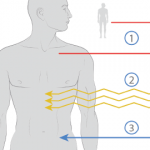And this cell is so smart that it knows when to stop.
Tunable Cells with a 6th Sense
“Not only are these cells adjustable to the level of inflammation in the environment, but they know when to cut off production,” explains Dr. Guilak.
The scientists tested the cells’ responsiveness across three orders of magnitude of TNF concentrations. Each concentration elicited the intended response—rapid, feedback-controlled inhibition of TNF.
Dr. Guilak notes, “Once the TNF has been blocked, the cell automatically stops making the therapeutic drug, because it is the presence and severity of inflammation that drives the production of the TNF inhibitor by these cells. Thus, the cells act in an autonomous manner to tune the expression of the therapeutic drug in proportion to the amount of TNF present, even at very high concentrations.”
“In addition, we found that these effects held, even with high concentrations of TNF. “We also showed that other pro-inflammatory cytokines, such as interleukin 1, can be rapidly antagonized with a similar, cell-autonomous strategy. Our hope is that using a targeted, feedback-controlled system, such as this, will minimize the side effects that can occur with biologic drugs, such as TNF inhibitors, because they are currently given continuously at high doses.”
Next Steps

Jonathan Brunger, PhD
As for the most exciting near-term regenerative medicine opportunities that this work may lead to, Dr. Brunger says, “To be able to hijack cellular machinery to execute programmed, therapeutic responses and then engineer living tissue replacements from these ‘designer cells’ really opens up novel approaches, not only for the treatment of a variety of rheumatologic conditions, but for other chronic diseases as well—diabetes and Crohn’s disease, for example. This approach can also be used to enhance other cell therapies where feedback control is critical, such as cancer immunotherapy.
“Recent studies have shown that certain biomarkers for rheumatoid arthritis may precede the development of symptoms. Because early treatment can reduce the chance of joint damage and disability, a cell-based vaccine may be able to provide a means of stopping arthritis and other autoimmune diseases when the first signs of disease are detected.”
This work follows recent studies by Dr. Guilak’s group where they were able to grow an entire cartilage hip joint surface in the lab using stem cells and a biomaterial scaffold.
As for their next steps, Dr. Guilak states, “We are now testing these cells in several different mouse models of arthritis to ensure their safety and efficacy. An important step will be to determine the best way to deliver these cells systemically or directly to the joint so they provide the maximum beneficial effect. Our early studies look very promising in this respect. If things go as planned, we may be able to start human safety trials within several years.”


